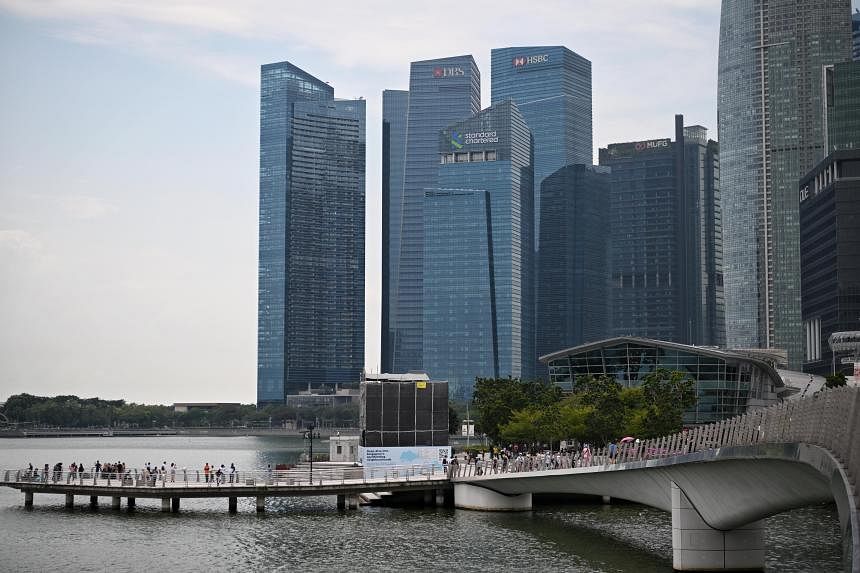SINGAPORE – As Singapore is a small and open economy, survival will depend on its ability to adapt its strategies to tackle global changes and manage the link between economic and security interests better than its competitors, Trade and Industry Minister Gan Kim Yong said on Thursday.
He said a new Bill on regulating major investments in critical entities introduced on Monday is part of the strategy to improve the nation’s economic resilience and security.
“The Bill will strengthen our position as a trusted hub for businesses to invest with confidence in a stable, safe and secure Singapore,” he added.
The move is one of several strategies Mr Gan outlined to help Singapore navigate an increasingly turbulent global order that has involved a reorganisation of alliances and supply chains, and a rebalancing of priorities.
He was speaking at the 39th Singapore Economic Roundtable organised by the Institute of Policy Studies at Orchard Hotel.
Mr Gan said that over the next few weeks, the Government will engage with industry players, especially entities being considered for potential designation under the Bill.
“We will share the details of the Bill and we will be working with them on the implementation details as well,” said the minister.
Singapore is also setting up a dedicated office to implement the Bill and closely engage with businesses and investors once it is passed.
This will ensure that the process is as efficient as possible, said Mr Gan.
Singapore currently relies on sectoral legislation to monitor and manage entities in regulated services such as telecommunications, banking and utilities.
Mr Gan said: “These tools have served us well and will continue to be important in our overall strategy. However, because of the increasingly complex economic environment, it is important for us to take a broader view on how we can more effectively manage the risks that may arise from some of these critical entities.”
Under the proposed law, designated companies will have to seek approval when there are certain changes in ownership or leadership.
Mr Gan reiterated that only a handful of entities are expected to be designated and regulated under the law, as the majority of critical entities are already covered by sectoral legislation.
The Bill has been designed to be business-friendly, he said, adding that designation applies to individual entities rather than whole sectors.
“We closely consulted industry representatives to take into account the views and suggestions from both businesses and investors.”
Another strategy involves expanding Singapore’s connectivity with regional and international economies, as this will help it ride a wave of global opportunities.
“We cannot afford to turn away from the global market. We also cannot afford to have the global market turn away from us,” Mr Gan said.
He said Singapore needs to continue strengthening the rules-based global trading architecture, noting that it has been a strong supporter of reforming the World Trade Organisation (WTO) dispute settlement system.
The Republic also launched the organisation’s Joint Statement Initiative on e-commerce together with Australia and Japan in 2017.
As at January, there were 87 WTO members taking part in negotiations to establish baseline rules to govern the global digital economy.
Singapore must continue to enlarge its network of trading partners and establish new connections with emerging markets, said Mr Gan.
“We are already a hyper-connected economy, with 27 free trade agreements (FTAs) with economies accounting for 60 per cent of the global GDP (gross domestic product). But we want to do more,” said Mr Gan.
He noted that Singapore in 2022 signed an FTA with the Pacific Alliance, the eighth-largest economy in the world, and has substantively concluded negotiations on an FTA with South American trade bloc Mercosur.
Mr Gan said: “These agreements allow our companies to unlock new market opportunities and diversify our supply chains.
“For example, in recent years, we have seen a greater variety of food-related imports from Latin America, such as pork from Mexico, in addition to chicken from Brazil… This has helped to strengthen the resilience of Singapore’s food supply system.”
Another approach Singapore has taken is to seek new areas of cooperation, such as sustainability and the digital economy, to strengthen its relevance as a global business hub.
He pointed to the Singapore-Australia Green Economy Agreement, the first partnership of its kind, which will facilitate local businesses’ overseas trade and investments in green goods and services, and encourage them to reduce their emissions and decarbonise.


